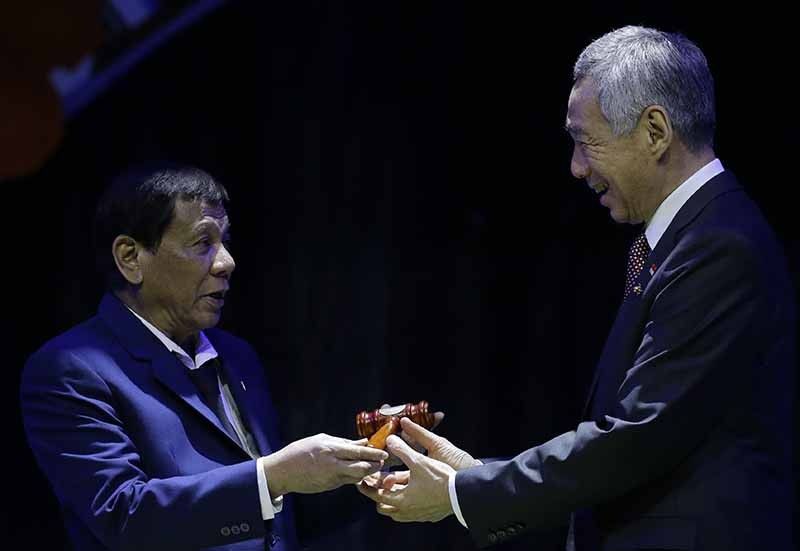Commentary: ASEAN chair Singapore faces challenges as US-China tensions continue to rise

The ten member states of the Association of Southeast Asian Nations are now in the center of a potentially dangerous 21st century great powers’ stand-off. They find themselves in a classic security dilemma with an increasingly threatening China in a maritime dispute that has caught the attention of the U.S., which itself is trying to maintain its naval primacy in East Asia.
Thus, with the growing involvement of countries like Japan, the South China Sea imbroglio is now a proxy for the deeper strategic competition between Washington and Beijing in the Asia-Pacific region.
This stand-off can ignite into a major systemic conflict. The more immediate concern for ASEAN, however, is how to balance their interests and decisions in the context of their alliance or partnership arrangements with the United States and their trade and economic relationship with China.
Indonesian Foreign Minister Marty Natalegawa described this situation as a dynamic equilibrium among the major powers in the Asia-Pacific with its rival coalition and arms races that keeps ASEAN in the middle similar to the conductor of an orchestra. While this situation is surely worthy, the orchestra will decline into chaos should it fail to keep U.S.-China tension in check.
The Dragon’s expansion in the South China Sea
That being said, ASEAN’s growing paralysis in the face of China’s expansion in the South China Sea dispute is evidenced by the failure to formulate a draft Code of Conduct despite regular meetings from as early as 2011.
During the 30th ASEAN summit in Manila, the final summit communique even failed to mention China’s land reclamation and the installation of military structures on these artificial islands.
While ASEAN remained paralyzed and divided over the South China Sea dispute, China has rapidly expanded its strategic footprint across disputed land features in the Paracel and Spratly Islands, deploying its military, coast guard and paramilitary patrols across contested waters.
The Eagle reacts
Confronted by such activities, the U.S. Navy conducted three separate Freedom of Navigation (FONS) patrols near Chinese-occupied features in the South China Sea.
The USS Dewey sailed near Mischief Reef on May 25. In July, the USS Stethem conducted a FON operation in the Paracels to challenge the excessive maritime claims by China, Vietnam, and Taiwan.
Then in August, the USS John S. McCain conducted another FON off Mischief Reef despite warning from a Chinese frigate asking the ship to leave Chinese waters. In 2017, U.S. Defense Secretary James Mattis made a veiled warning to China as he said, “We oppose countries militarizing artificial islands, and enforcing maritime claims unsupported by international law. We cannot and we will not accept unilateral, coercive changes to the status quo.”
Shortly afterward, the Trump administration released its “National Security Strategy” and “National Defense Strategy,” identifying national security threats as well as strategic goals and capabilities in relation to the threats. Both documents are essentially open declarations of Washington’s readiness to confront China, which it described as a threat that can overthrow the current international system, in a highly competitive great game in the Indo-Pacific region.
The challenge for Singapore’s chairmanship
As the smallest among the five original ASEAN states, Singapore’s foreign policy has been guided by the realist view that “smaller states must accept large power involvement as a fact of international relations and they must use it for their advantage.” This aphorism becomes handy for Singapore as it takes over the ASEAN chairmanship, which this year is guided by two goals: Resilience and Innovation.
Singapore seeks to enhance ASEAN’s capacities to address both internal and external security challenges, include terrorist threats, the territorial dispute in the South China Sea, the North Korean nuclear weapons program, and the adverse impact of great power rivalry on Southeast Asia.
ASEAN must manage this myriad of security challenges especially the increasing geo-strategic rivalry between, on one hand, the U.S., Japan and Australia, and on the other hand, China.
The key challenge for Singapore is to manage intra-ASEAN dynamics to ensure that it remains united and cohesive to perform its role in managing regional peace and stability. It must also be able to monitor relations between individual ASEAN member states and the great powers as this will have a significant impact on the ability of the member states to maneuver between the stated ASEAN policy and their respective foreign policies.
Singapore will have to find the necessary means of confronting the challenge of unifying all ASEAN member-states into a single voice on contentious issues such as the South China Sea dispute and great powers’ competition as this will determine the long-term credibility of this regional association.
The other challenge for Singapore is steering ASEAN within the dangerous waters of great-powers’ competition which would require the association from taking sides.
As the great power rivalry over the South China Sea intensifies, the Southeast Asian states are slowly being forced to make a choice between a superpower (and its allies) determined on maintaining the status quo and an emergent regional power resolute to alter the current territorial arrangements in maritime East Asia.
As ASEAN chair, Singapore has to find a way to manage the differences among these great powers as they shift to preserve their respective interests and positions in a changing regional security situation.
——
Dr. Renato Cruz de Castro is a trustee and convenor of the National Security and East Asian Affairs Program of independent think tank Stratbase ADR Institute.
- Latest




























